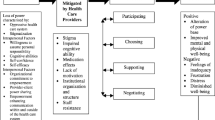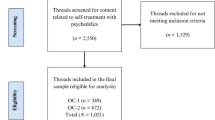Abstract
Research with families of people with serious mental illness consistently shows that the concerns and conundrums about their loved one’s medication are among those most centrally voiced. The inquiry here relied on an anonymous cross-sectional survey of attitudes, beliefs, and experiences of family members (N = 339) specifically related to psychiatric medication use. A latent profile analysis yielded two categories of respondents: those “skeptical of the medical model,” which represented 43% of the survey respondents, and those “supportive of the medical model,” which represented 57% of the survey respondents. Data from open-ended questions suggests families crave inclusion and wish providers would more radically embrace both collaboration and balance in their approach to medication maintenance. The hope of this research is to help mental health providers be more responsive and compassionate in their work with families of people with serious mental illness, especially as it relates to psychiatric medication.

Similar content being viewed by others
References
Abid, H., Hamdani, S. U., Shafique, F., & Aadil, M. (2018). Parental psychosocial attitudes and opinions on the use of psychotropic medication in mental disorders of childhood. Pakistan Armed Forces Medical Journal, 68(1), 131–136.
Aldersey, H. M., & Whitley, R. (2015). Family influence in recovery from serious mental illness. Community Mental Health Journal, 51(4), 467–476.
Bentley, K. J. (2010). Psychiatric medication and meaning-making in a residential program for adults with serious mental illness. Qualitative Social Work, 9(4), 479–499. https://doi.org/10.1177/1473325010367822.
Bentley, K. J., & Casey, R. C. (2017). Incarcerated women’s experiences and beliefs about psychotropic medication: An empirical study. Psychiatric Services, 68(4), 384–389. https://doi.org/10.1176/appi.ps.20160007.
Bentley, K. J., Rosenson, M. K., & Zito, J. M. (1990). Promoting medication compliance: Strategies for working with families of mentally ill people. Social Work, 35, 274–277.
Bentley, K. J., & Walsh, J. (2014). The social worker and psychotropic medication: Toward effective collaboration with clients, families and providers (4th ed.). Belmont, CA: Cengage-Brooks/Cole.
Carter, L., Read, J., Pyle, M., & Morrison, A. P. (2017). The impact of causal explanations on outcome in people experiencing psychosis: A systematic review. Clinical Psychology and Psychotherapy, 24, 332–347. https://doi.org/10.1002/cpp.2002.
Casey, R. C., & Bentley, K. J. (2019). Psychotropic medication experiences of incarcerated women: Qualitative inquiry into conundrums of access and identity. Women and Criminal Justice, 29(1), 1–13. https://doi.org/10.1080/08974454.2017.1389331.
Cleary, M., Freeman, A., Hunt, G. E., & Walter, G. (2005). What patients and carers want to know: An exploration of information and resource needs in adult mental health services. Australia and New Zealand Journal of Psychiatry, 39(6), 507–513.
Crowe, A., & Lyness, K. P. (2014). Family functioning, coping, and distress in families with serious mental illness. The Family Journal, 22(2), 186–197.
Dosreis, S., Mychailyszyn, M., Evans-Lacko, S., Beltran, A., Riley, A., & Myers, M. (2009). The meaning of atention deficit/hyperactivity disorder medication and parents’ initiation and continuity of treatment for their child. Journal of Child and Adolescent Psychopharmacology, 19(4), 377–383.
Drapalski, A. L., Marshall, T., Seybolt, D., Medoff, D., Peer, J., Leith, J., & Dixon, L. (2008). Unmet needs of families of adults with mental illness and preferences regarding family services. Psychiatric Services, 59, 655–662.
EnglandKennedy, E. S., & Horton, S. (2011). “Everything that I thought they would be, they weren’t”: Family systems as support and impediment to recovery. Social Science & Medicine, 73, 1222–1229.
Flyckt, L., Fatouros-Bergman, H., & Koernig, T. (2015). Determinates of subjective and objective burden of informal caregiving of patients with psychotic disorders. International Journal of Social Psychiatry, 61(7), 684–692.
Glick, I. D., Stekoll, A. H., & Hays, S. (2011). The role of the family and improvement in treatment maintenance, adherence, and outcome for schizophrenia. Journal of Clinical Psychopharmacology, 31(1), 82–85.
Gray, B., Robinson, C., & Seddon, D. (2008). Confidentiality smokescreens and carers for people with mental health problems: The perspectives of professionals. Health and Social Care in the Community, 16, 378–387.
Hurley, D., Swann, C., Allen, M. S., Ferguson, H. L., & Vella, S. A. (2020). A systematic review of parent and caregiver mental health literacy. Community Mental Health Journal, 56, 2–21.
Jordan, J., Patel, N., & Bentley, K. J. (2017). Emerging adult identity following adolescent experiences with psychotropic medications. Journal of Human Behavior in the Social Environment, 27(7), 694–705. https://doi.org/10.1080/10911359.2017.1327390.
Kemp, J., & LickelDeacon, J. J. B. J. (2014). Effects of a chemical imbalance causal explanation in individuals’ perceptions of their depressive symptoms. Behavior Research and Therapy, 56, 47–52. https://doi.org/10.1016/j.brat2014.02.009.
Labrum, T., & Solomon, P. (2018). Safety fears held by caregivers about relatives with psychiatric disorders. Health & Social Work, 43(3), 165–173.
Lakeman, R. (2008). Family and carers participation in mental health care: Perspectives of consumers and carers in hospital and home care settings. Journal of Psychiatric and Mental Health Nursing, 15(3), 203–211.
Lazaratou, H., Anagnostopoulos, D. C., Alevizos, E. V., Haviara, F., & Ploumpidis, D. N. (2007). Parental attitudes and opinions on the use of psychotropic medication in mental disorders of childhood. Annals of General Psychiatry, 6, 32.
Lebowitz, M. S. & Ahn, W. (2014). Effects of biological explanations for mental disorders on clinician’s empathy. Proceedings of the National Academy of Sciences (PNAS), 111(50), 17786–17790. www.pnas.org/cgi/doi/10.1073/pnas.1414058111.
Markoulakis, R., Turner, M., Wicik, K., Weingust, S., Dobbin, K., & Levitt, A. (2018). Exploring peer support needs of caregivers for youth with mental illness or addictions concerns in family navigation services. Community Mental Health Journal, 54, 555–561.
Marshall, A., Bell, J. M., & Moules, N. J. (2010). Beliefs, suffering, and healing: A clinical practice model for families experiencing mental illness. Perspectives in Psychiatric Care, 46(3), 197–208.
Marshall, T., & Solomon, P. (2003). Professionals’ responsibilities in releasing information to families of adults with mental illness. Psychiatric Services, 54(12), 1622–1628.
Marshall, T., Solomon, P., Steber, S., & Mannion, E. (2003). Provider and family beliefs regarding the causes of severe mental illness. Psychiatric Quarterly, 74(3), 223–236.
McNeal, R. E., Roberts, M. C., & Barone, V. J. (2000). Mothers’ and children’s perceptions of medication for children with attention-deficit hyperactivity disorder. Child Psychiatry & Human Development, 30(3), 173–187.
Morrison, P., & Stomski, N. (2017). Experiences of family carers for persons using antipsychotic medication. Australian & New Zealand Journal of Family Therapy, 38(3), 498–513.
Mueser, K. T., Bellack, A. S., Wade, J. H., Sayers, S. L., & Rosenthal, C. K. (1992). An assessment of the educational needs of chronic psychiatric patients and their relatives. British Journal of Psychiatry, 160, 674–680.
O’Brien, M., Crickard, E., Lee, J., & Holmes, C. (2013). Attitudes and experience of youth and their parents with psychiatric medication and relationship to self-reported adherence. Community Mental Health Journal, 49(5), 567–575.
Pescosolido, B. A., Perry, B. L., Martin, J. K., McLeod, J. D., & Jensen, P. S. (2007). Stigmatizing attitudes and beliefs about treatment and psychiatric medications for children with mental illness. Psychiatric Services, 58, 613–618.
Pusey-Murray, A., & Miller, P. (2013). ‘I need help’: Caregivers’ experiences of caring for their relatives with mental illness in Jamaica. Mental Health in Family Medicine, 10, 113–121.
Rose, L. E., Mallinson, R. K., & Gerson, L. D. (2006). Mastery, burden and areas of concern among family caregivers of mentally ill persons. Archives of Psychiatric Nursing, 20(1), 41–51.
Rowe, J. (2012). Great expectations: A systematic review of the literature on the role of family carers in severe mental illness, and their relationships and engagement with professionals. Journal of Psychiatric and Mental Health Nursing, 19, 70–82.
Rüsch, N., Todd, A. R., Bodenhausen, G. V., & Corrigan, P. W. (2010). Biogenic models of psychopathology, implicit guilt, and mental illness stigma. Psychiatry Research, 179, 329–332.
Sabanciogullari, S., & Tel, H. (2015). Information needs, care difficulties, and coping strategies in families of people with mental illness. Neurosciences, 20(2), 145–152.
Schroder, H. S., Duda, J. M., Christiansen, K., Beard, C., & Björgvinsson, T. (2020). Stressors and chemical imbalances. Beliefs about the causes of depression in an acute psychiatric sample. Journal of Affective Disorders, 276, 537–545.
Solomon, P., Molinaro, M., Mannion, E., & Cantwell, K. (2012). Confidentiality policies and practices in regard to family involvement: Does training make a difference? American Journal of Psychiatric Rehabilitation, 15, 97–115.
Stolzenburg, S., Freitag, S., Schmidt, S., & Schomerus, G. (2018). Associations between causal attributions and personal stigmatizing attitudes in untreated persons with current mental health problems. Psychiatry Research, 260, 24–29.
Vedana, K. G. G., Magrini, D. F., de Souza, J., Zanetti, A. C., Miasso, A. I., Filho, P. C., & Borges, T. L. (2016). Meaning of pharmacological treatment for families of people with depression. Issues in Mental Health Nursing, 37(4), 273–277.
Weimand, B. M., Hail-Lord, M. L., Sällstrom, C., & Hedelin, B. (2013). Life-sharing experiences of relatives of persons with serious mental illness: A phenomenographic study. Scandinavian Journal of Caring Sciences, 27(1), 99–107.
Wonders, L., Honey, A., & Hancock, N. (2019). Family inclusion in mental health service planning and delivery: Consumer perspectives. Community Mental Health Journal, 55, 318–330.
Wyder, M., & Bland, R. (2014). The recovery framework as a way of understanding families’ responses to mental illness: Balancing different needs and recovery journeys. Australian Social Work, 67(2), 179–196.
Zausniewski, J. A., & Bekhet, A. K. (2014). Factors associated with the emotional distress of women family members of adults with serious mental illness. Archives of Psychiatric Nursing, 28, 102–107.
Acknowledgements
The authors would like to graciously thank doctoral students Christine M. Orndahl and Keighly Bradbrook for their consultation on the data analysis. Their work was supported by the VCU Biostatistics Laboratory, which is partially supported by award No. UL1TR002649 from the National Institutes of Health’s National Center for Advancing Translational Science. We also thank the family members who gave voice to their experiences in hopes of making a difference.
Funding
This was an unfunded study. Doctoral students who provided statistical consultation were supported by a grant within their own department and were not connected in any other way to the study. The second author, at the time of data collection, was the executive director of the organization that distributed the link to the survey. All research procedures were approved by the authors’ University IRB (#HM20015898). All respondents consented to participate. No other financial or non-financial conflicts of interests are reported. Both authors certify they meet the definition of author and certify responsibility for the conduct of the study and the preparation of the manuscript.
Author information
Authors and Affiliations
Contributions
Both authors contributed to the study conception and design. Materials preparation and data collection were performed predominately by KJB, and data analysis and interpretation was conducted by both authors. The first draft of the manuscript was written by KJB. Both authors read and approved the final manuscript.
Corresponding author
Additional information
Publisher's Note
Springer Nature remains neutral with regard to jurisdictional claims in published maps and institutional affiliations.
Rights and permissions
About this article
Cite this article
Bentley, K.J., Thissen, R. Family Conundrums with Psychiatric Medication: An Inquiry into Experiences, Beliefs, and Desires. Community Ment Health J 58, 67–77 (2022). https://doi.org/10.1007/s10597-021-00792-y
Received:
Accepted:
Published:
Issue Date:
DOI: https://doi.org/10.1007/s10597-021-00792-y




